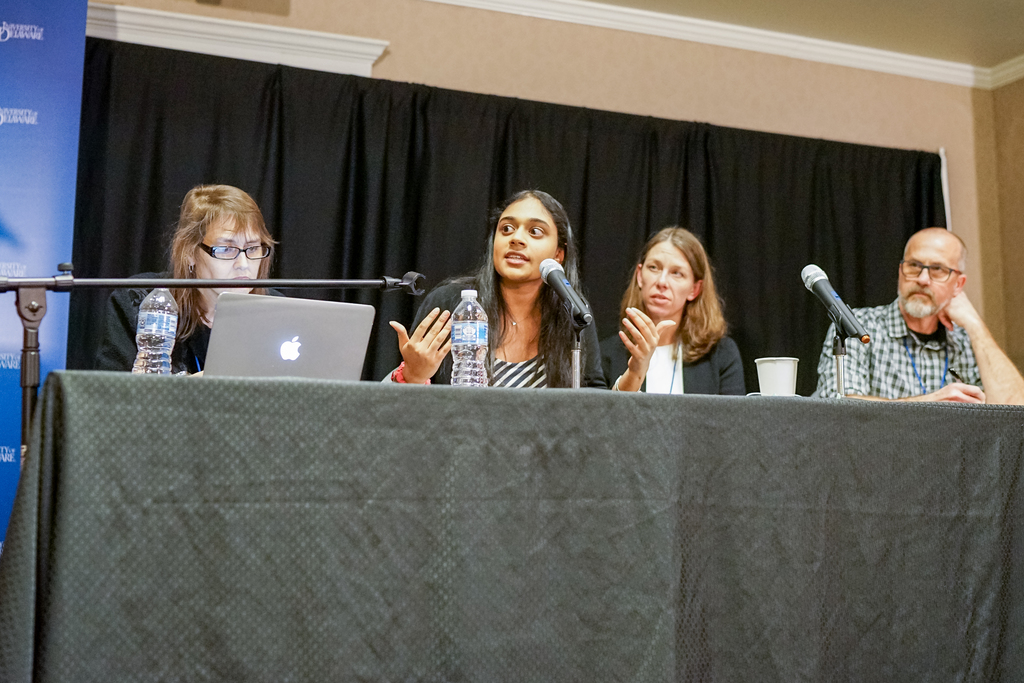The Speech Divide
Turn hate into positivity, recognize humility, practice kindness

By Caroline Gassert, University of Delaware junior and Center for Political Communication intern
Read a profile about Dr. Jennifer Lambe, organizer of Speech Limits in Public Life: At the Intersection of Free Speech and Hate
Read an interview with Nadine Strossen guest speaker at Speech Limits in Public Life conference on March 15, 2019
Read the UDaily article about the Speech Limits in Public Life conference.
Watch the Hate Speech on Campus video (Session 2).
Watch the Technically Wrong video (Session 4).
Listen to podcasts of the six panel discussions on March 15.
Read the transcripts of the six panel discussions on March 15: Session 1, Session 2, Session 3, Session 4, Session 5, and Session 6.
APRIL 4, 2019? Responding to hate speech is difficult because the line between what is and is not hate speech is unclear. However, the reiterated theme throughout the University of Delaware’s conference on free speech was the importance of positive communication. By recognizing the humility in others and treating with kindness those with differing beliefs, we can work as a whole to end this pattern of hate.
UD’s Communication Department hosted “Speech Limits in Public Life: At the Intersection of Free Speech and Hate,” inviting guest speakers and panelists from around the country to discuss defining hate speech and responding to it both digitally and on college campuses. The conference kicked off on March 14 with former violent extremist Christian Picciolini reflecting on his role with one of the most infamous white supremacist organizations. He described his experiences after he left the movement and his current initiatives to bring together people of different beliefs in hopes of opening a channel of communication and in turn transforming hate into positivity.
The conference continued the following day with panel discussions between a variety of professors, authors, students and activists on the moderation and responses to hate speech both online and on college campuses across the nation.
Trisha Prabhu, a Harvard undergraduate student, said the best way to prevent the spread of hate is to make younger students more aware of what is potentially hurtful or offensive.
Prabhu reflected on her struggles with bullying in middle school. In hopes of saving the next victim of bullying she created the Rethink App, which is coded to detect potentially offensive words and phrases. If detected, the app asks the user, “Are you sure you want to post this?” During testing, “93% of users corrected the offensive language or did not post,” said Prabhu. “We are now in 2,500 schools globally.” The preventative app not only teaches kids to recognize potentially offensive content, but also gives them an option to be the change.
The implementation of other moderation software online can act as a preventative barrier against offensive language. Brandi Collins-Dexter with Color of Change and Carmen Scurato with Free Press discussed rising instances of hate speech on digital platforms. Collins-Dexter pointed at gateway content in the form of suggested pages and advertisements based on your search history. “The world is shaped by who the internet thinks you are,” she said. Scurato recommended changing the corporate policies on social media platforms to limit the rapid and continued spread of hateful content.
Hate speech is not only an issue of the digital or physical environment but one that requires personal change to support global change. Founding director of University of Richmond’s Common Ground Glyn Hughes asks, “What’s happening to white supremacism as we talk about it in different ways?” When responding to the white supremacy march in Charlottesville, Virginia, the issue goes much farther than the faces we saw marching. “We ought to bring that same kind of urgency and self-inquiry to ourselves about any kinds of rationales in our institution, to not hear the voices of those whom we have historically excluded, to critique ourselves, to stand in the way of a critique of how we operate normally.”
Deb Mashek, Executive Director for the Heterodox Academy, agreed, giving the audience a few self-realization techniques to improve their actions and empathy of others. “We need to take time to hear and see the humility in those we hate,” Mashek advised. When presented with a conflict of the heart or mind we must ask ourselves, “What can I learn about myself by observing my reactions here?”
About the conference
“Speech Limits in Public Life” was made possible with support from the Institute for Humane Studies at George Mason University and the University of Delaware’s Office of the President, Office of the Provost, Office of the Vice Provost for Diversity, the Class of ?55 Ethics Endowment Fund and the College of Arts and Sciences? dean’s office, its Department of Communication and numerous other departments. Cosponsors are the Heterodox Academy and the UD Center for Political Communication.
